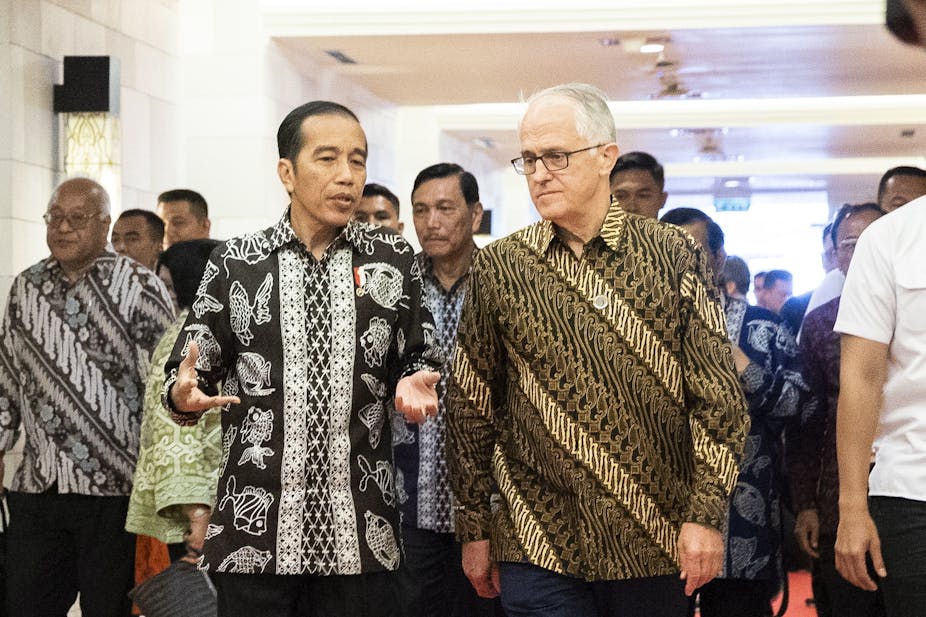Malcolm Turnbull was correct, in policy terms, when this week he called out Scott Morrison’s ill-judged plan for Australia to consider moving its embassy from Tel Aviv to Jerusalem.
The inevitable political consequence, however, is that the ex-prime minister has highlighted that his successor is expedient and a foreign affairs amateur.
Morrison sent Turnbull to Indonesia as head of Australia’s delegation to a conference about ocean sustainability. The trip was in the former PM’s diary when he was deposed; at the time Morrison decided to stick by the arrangement, the “Jerusalem” issue hadn’t arisen.
That announcement only came in the final week of the Wentworth byelection, with Morrison desperately trying to shore up the Jewish vote for the Liberals.
As Turnbull is personally close to President Joko Widodo, when the announcement ruffled Indonesian feathers, it was apparently hoped that Turnbull could do some smoothing.
If this were the thinking it was naïve, to the extent it ignored the inevitable consequences of putting Turnbull centre stage.
The trip might have been unremarkable if Turnbull’s activities had been confined to the oceans conference. But it looks very strange to have a recently-sacked PM conducting top-level talks with the Indonesian government about a highly controversial Australian initiative – with which he personally disagrees.
An observer – or the Indonesians - might ask: would the real prime minister please stand up?
After his Monday meeting with the President, Turnbull made it clear how off-the-cuff the Morrison announcement looked – in contrast to his own administration’s policy.
He said the conclusion he and his government had taken “after very careful and considered advice was that a policy that is well over 40 years old, 50 years old, should remain exactly the same as it is”.
Turnbull said Widodo had told him, as he had Morrison, of the very serious concern held in Indonesia about the prospect of the embassy being moved.
“There is no question, were that move to occur, it would be met with a very negative reaction”, in the heavily Muslim Indonesia, Turnbull said.
The hasty nature of Morrison’s announcement had already been exposed. At Senate estimates last week it was revealed that Foreign Minister Marise Payne had been informed only on the Sunday before the Tuesday announcement. The secretary of her department, Frances Adamson wasn’t told until the Monday, the same day officials of the Prime Minister’s department and the Defence department also learned of it.
There’d been no proper public service process sitting behind such a consequential proposal.
Morrison early on tried to fudge the immediate Indonesian blowback, although it was obvious via leaking. Turnbull has not just reiterated that criticism directly from the Indonesian President, but backed it up with his own support for making no change.
Forced to respond on Tuesday to Turnbull’s remarks, Morrison said a decision has not yet been taken, and “we will follow a proper process” - which seems rather late in the piece. He also stressed that “Australia decides what our foreign policy is and only Australia”.
Morrison is in an awkward situation. An outcome has been promised by year’s end. If the government opts against moving the embassy, it will disappoint Israel, which welcomed the rethink, as well as making even more obvious what a sham the original announcement was.
If it endorses the move, there will be a fresh reaction from Indonesia and others. And Turnbull’s critique will be already on the record.
The rightwingers inside the Liberal Party and among the commentariat opposed Turnbull being sent to the oceans conference, and they will feel vindicated following his remarks about the embassy.
Turnbull must know his comments are damaging to his successor. But like his refusal to help with a robo call or a letter in Wentworth, he’s going to do things his way now. Whether this will mean further interventions before the election remains to be seen. He has declared himself “retired” from politics but he’s also said “I’ll continue to have things to say about important matters of public interest”.
From another ex-prime ministerial corner Tony Abbott, without a blush, has started calling for party unity, an appeal that’s hard to take seriously given the disunity he’s caused.
Writing in Monday’s Australian Abbott argued: “Scott Morrison won’t have the problems that I had as PM because no one is stalking him for his job.
"He won’t have the problems Turnbull had as PM because he is a much more tribal Liberal, and because he’s done the best he could, under the circumstances, to acknowledge the two biggest personalities on his backbench”. (A rather immodest reference to himself and Barnaby Joyce, and their “envoy” jobs.)
Now that Abbott has seen the fall of the man who brought him down, he is apparently willing to behave better, despite Morrison declining to meet the hard right’s agenda on such matters as quitting the Paris climate agreement.
As he talks togetherness, some believe Abbott has his eye on post-election opposition leadership. More immediately, possibly he’s looking to his seat, where his wrecker image could be a liability if he faces a credible independent.
Whatever the motive, many Liberals will be cynical about the unity pitch, though the Prime Minister might be relieved. Given Abbott’s bitterness about Morrison after the 2015 coup, relations between the two are always delicate.
The continuing federal government shenanigans can only be causing despair in the Liberals’ Victorian division, as the state campaign begins, with the Coalition opposition trailing 46-54% in the latest Newspoll.
Although people do distinguish between state and federal when they vote, there is also overlap and the dumping of Turnbull was unhelpful for the Victorian Liberals. In the Newspoll, three in ten people said the federal leadership change had made them less likely to vote for the state Liberals.
If the state Liberals are trounced, some of the blame is likely to be tossed Canberra’s way, adding to Morrison’s pre-Christmas woes.

